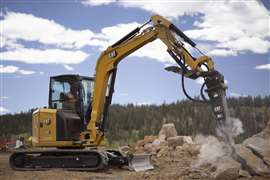Lindsey Anderson talks exclusively to Don Ahern, CEO of Ahern Rentals, about the Chapter 11 process.
28 January 2013

Las Vegas-based Ahern Rentals – the largest independent renter in the US - entered the Chapter 11 bancruptcy process in December 2011 and is still battling to come out. Don Ahern, the company’s CEO, talked exclusively to Lindsey Anderson, editor of IRN sister title Access lift & Handlers (ALH).
Don Ahern didn’t grow Ahern Rentals into one of the largest rental businesses in North America by being a soft touch, and all his pugnacious qualities come to the fore when he describes his experience of Chapter 11.
It has been “an incestuous and evil process”, he says, and to those who would like to see him leave the company he has a clear message; “If they force me out, I will be back in it before the sun comes up. If somebody else owns Ahern Rentals, I will be Ahern Rentals’ biggest competitor.”
Defiant or not, Mr Ahern is now dealing with the aftermath of a rapidly expansionist policy which, while growing annual revenues to $329 million by 2008, left the company with debts of more than US$600 million when the market crash came.
The first two months of 2009 alone saw a 17% decline in revenues year-on-year and rental rates falling by 13 percentage points. Time utilisation dropped from 66% to 55%.
Mr Ahern, speaking to ALH in Las Vegas in mid-December – in one of the very few interviews he has given in the past year – says he was forced into Chapter 11 because it was the only way for him to retain his ownership in the company (he has a 97% stake).
As he explains, there are three groups of creditors, the Bank of America (which holds $225 million of the debt), Goldman Sachs ($111 million), and four or five bondholders ($268 million), with private equity firm Platinum Equity the largest of these.
“Platinum was moving in on us real hard,” says Mr Ahern. “They contacted our banks and started causing problems. The banks said, ‘You better cut a deal with these bondholders or we’re going to gut you.’ We were forced to do business with them [Platinum].”
According to Mr Ahern, Platinum wanted ownership of the company. “The banks left us in a vulnerable position for the sharks to come in. About a year ago, we were still fighting with Platinum to come up with a deal. Platinum said, ‘There is no deal to be had. We want ownership, or, you always have the right, Don, to pay us off in full with accrued interest. Write us a check and we’ll be happy to go away.’
“We begged them for a deal,” he says. “They repeatedly said, ‘No deal. You’ll have to file bankruptcy if you don’t agree to what we want and what we want is 70% ownership of your company.’” So he did what no one expected he would do and filed for Chapter 11.
Although offering Ahern protection while it came up with a restructuring plan, the process has not been an easy one. Ahern’s plan was rejected by the judge last November, who said that the company had to pay off all the creditors in full at the same time in order for Don Ahern to retain his equity share.
Mr Ahern says he and his team came up with two plans – one which negotiated with the banks bond holders on a set interest rate and payment in full. “That’s what the bankruptcy court allows for,” he says. “It says under the absolute priority rule that I can retain ownership – I can retain my equity – but that I have to pay them back 100%.”
The second plan was for lenders to take a discount. If they wanted cash, Ahern had specific figures for each.
In addition to rejecting the plan, however, the judge also ruled that other interested parties could now put forward their own proposals, ending Ahern Rentals exclusive right to do so. Ahern contested this ruling but that appeal was thrown out by the Chapter 11 court: Ahern is appealing again to a higher court.
He is clearly bitter. “The judge should have given us time to negotiate,” he says, “The big story here is that our company is rapidly recovering and I think they’re trying to get it [the company] from us, because if we continue to recovery, it will be harder and harder for them to win this.”
According to Mr Ahern, the fact that the business is now operating on a much better footing should have influenced the decision. “This judge should be dancing,” he says, “This was a remarkable success story. It would have been so much easier to sell everything…Bankruptcy is to give a company an opportunity. We were not given that opportunity. Our recovery has been measureable and phenomenal. We are generating cash like crazy.”
The recovery has been such, he claims, that the company value now exceeds its debts. “We just finished the biggest month of our company’s history in October 2012. In October 2012, we returned to higher levels of utilisation and we’re doing a phenomenal recovery. All of the new stores are contributing cash to the business and the health of the business is radically, radically better.”
Current annual EBITDA levels are around $110 million (the peak in 2008 was $160 million), which, if a 7 or 8 times EBITDA multiplier was used, would make Ahern’s value larger than its debts. He notes that United Rentals bought RSC at a multiple of around 8.3.
“As the EBIDITA rises, you get a rise in the value of the business,” Mr Ahern points out. “The EBIDITA has been strengthening and now we are valuable and not in the hole. Suddenly, they are up against someone who could fight.”
Ahern remains in discussions with Platinum Equity, which four months ago entered into an agreement with Ahern to sell its bonds back, but at a discounted rate of up to one-third less of face value. Negotiations are also ongoing with Goldman Sachs and the company is working to get other financing as well.
“The great irony here is that [our] company never received a single written term offer from any of the debt holders that are involved here,” Mr Ahern says. “The only term offers that we put in writing were from the company’s point of view. We made a number of written offers.”
The outcome of the process is still uncertain. The business may be performing better, but there is no guarantee that the Chapter 11 courts will accept a new Ahern plan, and there is the risk, for Ahern, that someone else will come up with a plan that is approved by the court.
Whatever happens, Don Ahern has few regrets. He views himself and his company as a victim of the financial crisis and of an “evil” banking system.
He argues that the policy of opening new stores to provide a wider geographical outlet for the company’s fleet - 23 locations were opened in 2009 and 2010 - was the right thing to do. “If I had to do this again, I’d do it. There’s no other strategy that would work short of just quitting,” he says. “You couldn’t have sold the business or the assets to pay off the debt in 2009.” The company now has 77 locations across 22 US States.
He says the company is in a good position to prosper, arguing that despite almost three years of minimal investment his fleet is still in good condition, because utilisation levels have been low; “Our fleet is in great shape and we’ll compete with [the national rental companies] all day long with what we do”.
Construction is still struggling a bit across the US, but Mr Ahern says utilisation is quite strong. The company saw revenue growth of 22% in 2011 and a further 10% last year. He expects 2013 it to be a “great year”, exceeding 2012.
Reinvestment in the fleet has begun, although such investments are still tightly controlled by the Chapter 11 process (Ahern has to submit detailed accounts to the court every month). More than 300 JLG scissor lifts were purchased before the New Year. “Our CapEx spend is way above last year’s,” he says. “And next year [2013] will be even bigger.”
He allows himself some sympathy for creditors, particularly over payments of $75 million that he had to make to Bank of America rather than other creditors before the Chapter 11 stage was reached. “It was really kind of a bad deal for the bondholders and I feel poorly for them,” he says, “I don’t want anybody to ever lose a dollar on me. I’ve been in business here, my dad and I, for 60 years. We’ve never not paid a bill. Even a buck!”
Sitting as he is on more than $600 million of debt, those words are likely to be received with exasperation in some quarters. Equally so his defiant message about his company; “We are the only independently owned rental company at the top of the 15 or 20 in the world,” he says. “We are outperforming almost everyone in the industry. Every company should aspire to be as successful as us.”



